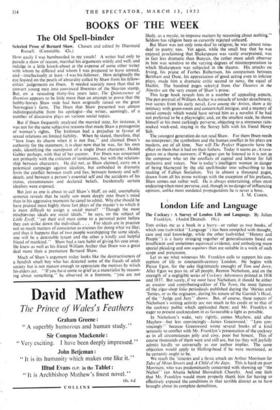BOOKS OF THE WEEK
The Old Spell-binder
Selected Prose of Bernard Shaw. Chosen and edited by Diarmuid Russell. (Constable. 42s.) How easily I was bamboozled in my youth! A writer had only to parade a show of reason, marshal his arguments wittily and well, and indulge in a little knock-about at the expense of some other writer with whom he differed and whom I was prepared to leave unread, and—intellectually at least—I was his follower. How delightedly the eye feasted on the pearls of absurdity culled by Shaw from his fellow- critics' judgements on Ibsen. It needed scarcely mote than that to convert young men into convinced lbsenites of the Shavian stamp. But, on a rereading thirty-five years later, The Quintessence of lbsenism appears to be little more than an attempt to prove that the hobby-horses Shaw rode had been originally raised on the great Norwegian's farm. The Ibsen that Shaw presented was almost indistinguishable from his apologist—the writer, seemingly, of a number of discursive plays on various social topics.
But if Ibsen frequently analysed the married state, for instance, it was not for the same subjective reasons that made Shaw a protagonist of woman's rights. The Irishman had a prejudice in favour of sexual relations on limited liability. When he stated, therefore, that "love loses its charm when it is not free," and claimed lbsen's authority for the statement, it is clear now that he was, for his own ends, identifying the standpoint of a single Ibsen character, Hedda Gabler perhaps, with that of her creator. For Ibsen was concerned not primarily with the criticism of institutions, but with the relation- ship between characters. He did not, as Shaw claimed, carry on a polemical campaign against idealists, but embodied in dramatic form the conflict between truth and lies, between honesty and self- deceit, and between a person's essential self and the accidents of his status, circumstances and declared beliefs. Incidentally certain idealists were exposed.
But just as one is about to call Shaw's bluff, an odd, unemphatic sentence reveals that he really saw more deeply into lbsen's mind than in his aggressive moments he cared to admit. Why else should he have praised most highly those last plays of the master's to which it is most difficult to assign a social moral? "Though the most mischievous ideals are social ideals," he says, on the subject of Little Eyolf, "yet their evil must come to a personal point before they can strike down the individual. . . . For ideals are in practice not so much matters of conscience as excuses for doing what we like; and thus it happens that of two people worshipping the same ideals, one will be a detestable tyrant and the other a kindly and helpful friend of mankind." Shaw had a rare habit of giving his case away. He knew as well as his friend William Archer that Ibsen was a great deal more than a premature Bernard Shaw.
Much of Shaw's argument today. looks like the destructiveness of a fiendish small boy who has detected some of the frauds of adult society but is not mature enough to appreciate the motives by which his elders act. "If you have come to grief as a materialist by reason- ing about something," he observed in a footnote, "you are not likely, as a mystic, to improve matters by reasoning about nothing." Seldom has rejigion been so cursorily rejected unheard.
But Shaw was not only tone-deaf to religion; he was almost tone- deaf to poetry too. Yet again, while the small boy that he was enjoyed proclaiming that Shakespeare was vastly overpraised, was in fact less dramatic than Bunyan, the rather more adult observer in him was sensitive to the varying degrees of misinterpretation to which Shakespeare was subjected in die theatre. His, attacks 'on Irving, his praise of Forbes Robertson, his comparison between Bernhart and Duse, his appreciation of good acting even in inferior plays, made him a dramatic critic second to none, the equal of Hazlitt. The hundred pages select.7.4 from Our Theatres in the Nineties are the very cream of Shaw's prose.
This large book reveals him in a number of appealing aspects. The pen-portrait of-William Archer is a miracle of tender detachment; two scenes from his early novel, Love among the Artists, show a sly intimacy with green-room and concert-hall intrigue, and a mastery of social comedy which would have served him as a novelist if he had not preferred to be a playwright; and, on the smallest scale, he shows himself at his most carkingly perverse, objecting to a strenuous rain- soaked week-end, staying in the Surrey hills with his friend Henry Salt.
The youngest generation do not read Shaw. For them Ibsen needs no interpreter; the symbolism and the human conflict in his plays are modern, are a all time. Nor will The Perfect Wagnerite have the effect on them that it had on their fathers. Today it seems an x:rava- ganza on a theme outworn; if Wagner can be listened to it is not as the composer who set the conflicts of capital and labour for full orchestra and voices. Nor is today's intelligent woman in danger of being blarneyed by the old spell-binder into subscribing to his reading of Fabian Socialism. Yet in almost a thousand pages, drawn from all his prose writings with the exception of his prefaces, Shaw comes out rather well. He is always entertaining, often most endearing when most perverse, and, though in no danger of influencing opinion, unlike most outdated propagandists he is never a bore.
J. M. COHEN.


































 Previous page
Previous page